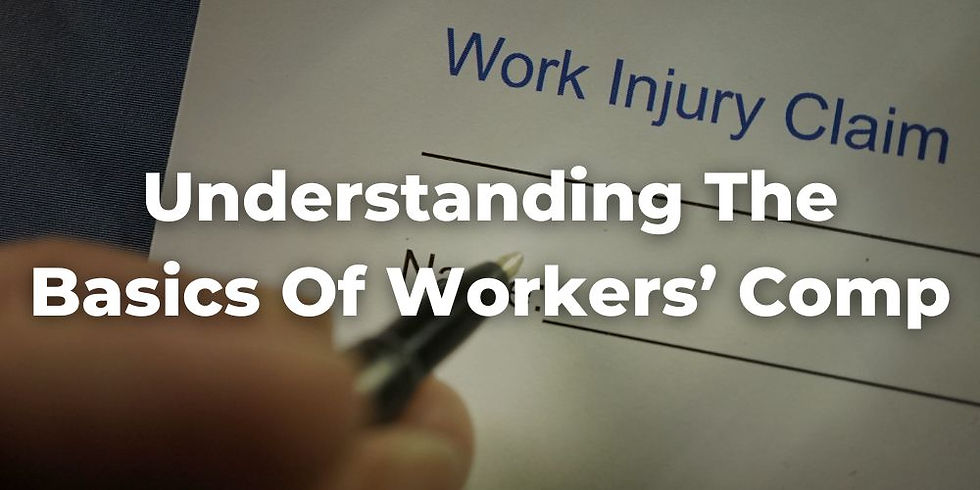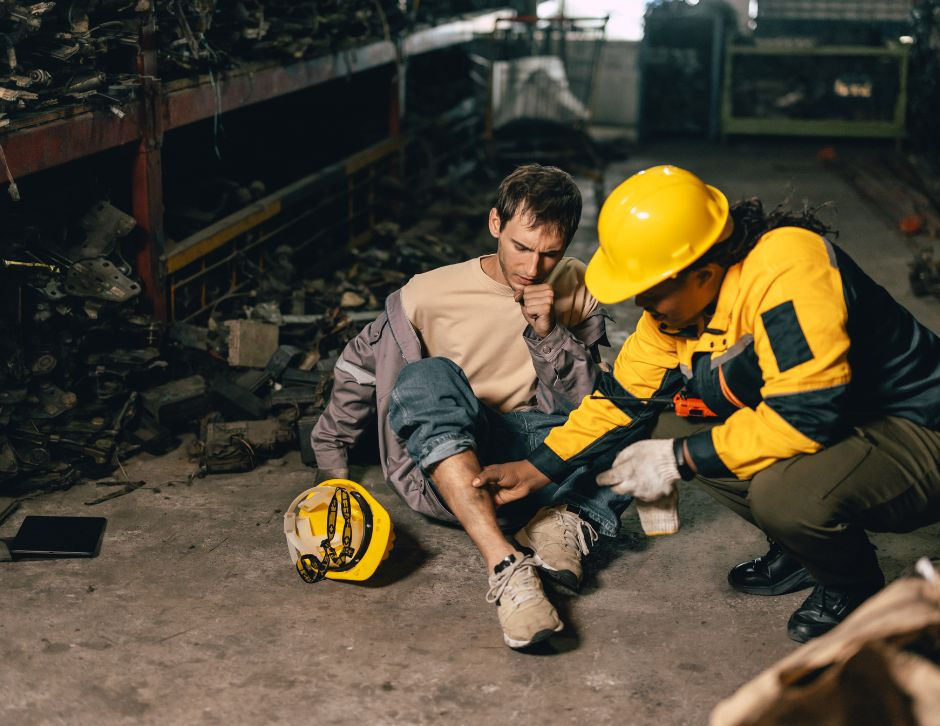What is Foreign Voluntary Workers' Compensation (FVWC)?
- John Larrimer

- Jul 21, 2025
- 5 min read
These days, it is not uncommon for employees of companies in the US to be sent overseas for work-related reasons. This raises a question, however. What happens if an American employee is injured when they are working overseas?
Foreign voluntary workers' compensation is a form of insurance that offers workers' compensation benefits to US employees when they are working abroad. This comprehensive coverage provides employers who have employees traveling abroad and employees stationed in another country protection similar to workers' compensation coverage.
Larrimer & Larrimer, a workers’ compensation law firm in Columbus, Ohio, explains the ins and outs of FVWC and why it matters. They can also answer the question of Can I file a workers' comp claim as a truck driver in Ohio?

Understanding the Basics of Workers’ Compensation
In order to understand FVWC, it's important to first understand how domestic workers' compensation works. In the US, each state has it's own workers compensation system, and this offers benefits such as medical care, wage replacement, and disability coverage to those who have a severe injury or become ill when on the job. Employers are typically required to carry workers comp insurance to protect employees. However, this is only in the US. When an employee is injured outside of the country, workers compensation laws might not apply.
What is Foreign Voluntary Workers’ Compensation (FVWC)?
Foreign Voluntary Workers' Compensation (FVWC) is a type of insurance policy that basically extends the benefits received by workers comp to workers who are operating outside of the country. These policies are voluntary, unlike workers compensation insurance, but they are highly recommended for companies that have employees who engage in business travel and those who work outside of the US.
Who Needs FVWC Coverage?
FVWC is most commonly purchased by companies that:
Send employees on international business trips
Have offices or facilities in foreign countries
Want to provide coverage to employees on long term assignments
Employ expatriates or contractors overseas
Participate in construction, engineering, or oil and gas projects abroad
Engage in governmental or defense-related contracts outside the U.S.
Even a short term assignment or quick business meeting in another country can create a risk for employers who do not have FVWC coverage.
What Does FVWC Cover?
FVWC exists to provide the same benefits as state workers’ compensation policies while also taking other situations into consideration. This typically covers employees in the following ways:
1. Medical Expenses
FVWC pays for medical care that is necessary to treat the worker’s injury or illness. This includes hospital stays, surgeries, medications, medical bills, emergency services, ongoing medical care, emergency medical evacuation, and rehabilitation services—even if these are provided in a foreign country.
2. Lost Wages
If the employee is temporarily or permanently unable to work, FVWC provides wage replacement benefits to minimize financial impact.
3. Disability Benefits
Workers who suffer a permanent partial or total disability can receive long-term compensation under this global insurance program.
4. Death Benefits
If the employee dies as a result of a work-related injury or illness abroad, FVWC can provide financial support to surviving family members or dependents.
5. Emergency Evacuation and Repatriation
Many FVWC policies include coverage for medical emergency evacuation if medical treatment is not available in the local area. Repatriation expenses (returning the injured or deceased employee to their home country) are often covered as well.
6. Endemic Disease Coverage
Unlike standard policies from insurance providers, FVWC can include coverage for diseases that are specific to the region where the employee is working—something especially important in areas with malaria, dengue fever, or other health risks.
How Is FVWC Different from Other International Insurance Policies?
It’s important to distinguish FVWC from other types of insurance. Keep in mind that this can overlap with other policies to offer comprehensive support outside of the employee's home country.
Travel Insurance: Offers basic medical coverage but usually excludes work-related injuries.
Health Insurance: May not be accepted in foreign hospitals and often excludes job-related incidents.
Defense Base Act (DBA) Coverage: Required for federal contractors working overseas, but not all private employers are covered.
Employers’ Liability Insurance: Covers legal costs if an employee sues but does not offer wage replacement or medical care.
FVWC fills these gaps by offering workers’ comp-style coverage in foreign locations—ensuring care for employees and legal compliance for employers.
Legal Complexities of International Claims
While FVWC is an important safety net for employees, it also presents unique legal and procedural challenges:
Jurisdictional Issues: It may be unclear whether or not a claim should be handled under U.S. law, the laws of the host country, or both.
Choice of Law Clauses: Policies often include language designating which legal system applies in the event of a claim.
Double Recovery Risks: Employees who qualify for both foreign and U.S. benefits may need to coordinate their claims to avoid double recovery or benefit denial.
Time Zones and Language Barriers: Managing claims across different areas or countries requires coordination with local medical providers, adjusters, and possibly foreign legal counsel.
Keep in mind that local laws may apply in these cases, and third country nationals and local nationals are not covered, even if they are also involved in the incident.
Additionally, our workers comp lawyer in Columbus familiar with workers’ compensation and international employment law—such as those at Larrimer & Larrimer—can help navigate these challenges.
Why FVWC Matters for Employers and Employees
For employers, FVWC is more than just an insurance policy—it’s an investment in risk mitigation and employee safety. It allows companies to:
Recruit and retain top talent who are willing to travel or relocate
Minimize exposure to international litigation or compliance failures
Provide peace of mind to workers and their families
Fulfill duty-of-care obligations in a global work environment
For traveling employees, FVWC ensures they are not left stranded without support if something goes wrong. It guarantees access to medical care, wage replacement, and other critical benefits—regardless of their location.

Reach Out to Larrimer & Larrimer for Assistance with FVWC
Foreign Voluntary Workers’ Compensation (FVWC) is a specialized insurance solution that ensures U.S. employees working abroad are covered by benefits similar to workers’ compensation benefits. It is not mandatory for employers, but for companies conducting business in foreign countries, it can help an injured worker cover injuries in the event that they were hurt on the job.
Larrimer & Larrimer helps employers and employees both understand the claims process in these cases, and can help an injured employee get the additional benefits that they deserve. For more information on FVWC or assistance with a foreign work injury claim, contact Larrimer & Larrimer in Columbus, Ohio for a free consultation.
.png)



Many players discover Loop Breakout casually online, but stay for the mental challenge. Beneath its clean 2D look, Loop Breakout hides layered puzzles that keep curiosity alive level after level.